You’ve likely stumbled upon countless articles claiming to teach you how to say “I love you” in different languages. However, these often miss the crucial subtleties that truly convey heartfelt emotions. Just as English distinguishes between “I like you,” “I love you,” and “I’m in love with you,” Japanese offers a rich tapestry of expressions for affection, each with its own unique weight and context.
Instead of simply equating “I love you” with a single Japanese phrase, this guide, crafted by lovepink.net’s content experts, delves into the nuanced world of expressing love in Japanese. We’ll explore the various phrases and, crucially, understand how to write them, ensuring you communicate your feelings authentically and appropriately.
We’ll navigate the delicate differences between:
- 好きだよ (suki da yo) and 大好きだよ (daisuki da yo) – Exploring the spectrum of “like” to “love.”
- 愛してるよ (ai shiteru yo) and 愛してます (ai shitemasu) – Unpacking the depth and formality of “Ai Shiteru.”
- The Significance of Silence – Understanding unspoken expressions of love.
- 恋に落ちた (koi ni ochita) – Differentiating “falling in love” from “I love you.”
Before diving into the intricate details, particularly beneficial for serious learners of Japanese, let’s address the straightforward answer, while acknowledging the richness of human communication it might overlook:
The Simple Answer: “I Love You” in Japanese
 Heart Emoji
Heart Emoji
“I love you” = 愛してる (Ai Shiteru)
While 愛してる (ai shiteru) is often presented as the direct translation, understanding its proper usage is paramount. If you aim to truly grasp how to write and use “I love you” in Japanese with genuine understanding, continue reading for a more comprehensive explanation.
好きだよ (Suki da yo) / 大好きだよ (Daisuki da yo): Expressing “Like” and “Love”
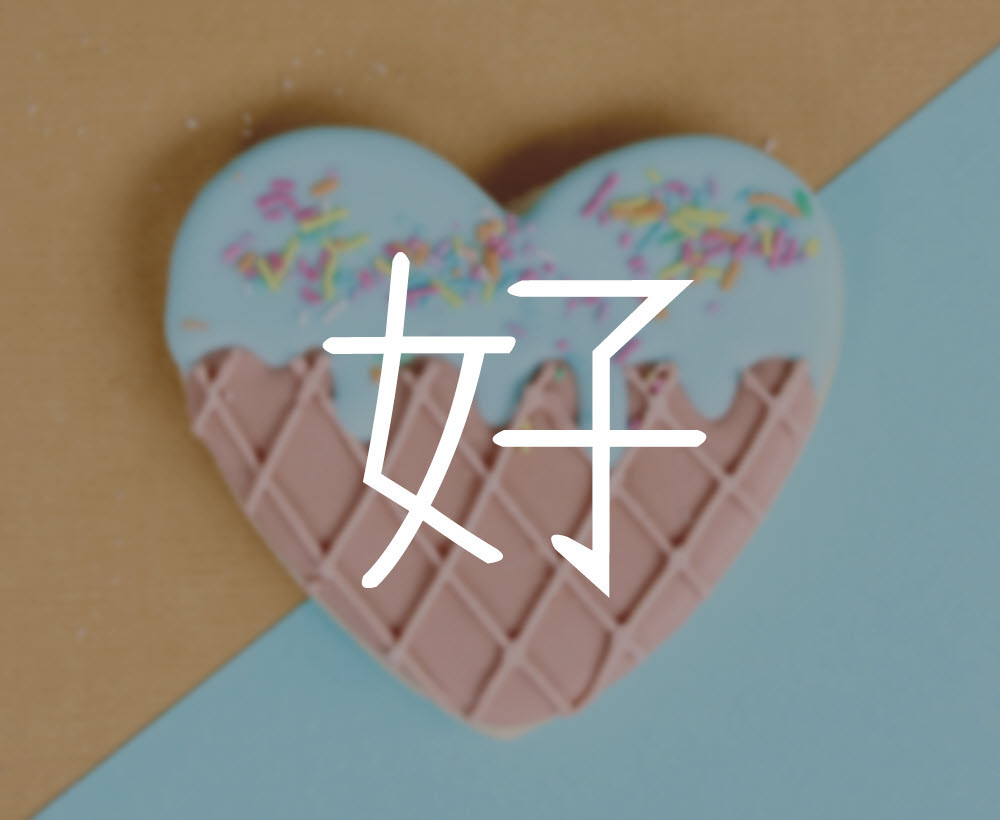 Kanji for Suki – Like
Kanji for Suki – Like
好 (Suki) = liking; pleasing; favored
好きだよ (Suki da yo) – I like you. / I love you. (Context-dependent)
 Kanji for Dai – Big
Kanji for Dai – Big
大 (Dai) = big; large
大好きだよ (Daisuki da yo) – I really like you. / I love you.
Technically, 好き (suki) and 大好き (daisuki) translate to “I like you” or “I really like you.”
ピザ好き (Piza suki) – I like pizza.
However, when directed towards a romantic interest, 好きだよ (suki da yo), and especially 大好きだよ (daisuki da yo), can certainly convey “I love you,” depending heavily on the relationship’s stage and the situation. This is particularly true for 大好きだよ (daisuki da yo).
大 (dai // big) + 好き (suki // liking) = like very much; love
Think of 大好き (daisuki) as existing on three levels of affection, each mirroring different nuances of the English word “love”:
The Three Levels of 大好き (Daisuki)
 Shark Valentine – Love Levels
Shark Valentine – Love Levels
1) “Much Feels”: The “I love pizza” Level
In casual contexts, like expressing enjoyment of food, 大好き (daisuki) signifies strong liking, similar to “love” for inanimate objects or activities in English.
ピザ大好き! (Piza daisuki!) – I love pizza!
This “love” is clearly different from romantic love; it’s about strong preference and enjoyment.
2) “Very Much Feels”: The “I love spending time with you” Level
Imagine someone named Ted on a second date with someone named Thousand Cranes. After a fun evening, Thousand Cranes might say:
テッド大好き! (Teddo daisuki!) – I love you! / I love spending time with you! / I really like you! (Literally: Ted + big-liking!)
In this scenario, 大好き (daisuki) expresses strong affection and enjoyment of the person’s company, closer to “I really like you” or “I love spending time with you” in English. It’s affectionate but not necessarily a deep, romantic declaration.
3) “Super Feels”: The True “I love you” Level
Consider a more profound situation. Imagine being in a hospital with a loved one, sharing a quiet moment amidst difficulty. In such a setting, saying 大好きだよ (daisuki da yo) can carry the full weight of “I love you,” expressing deep, heartfelt emotion.
大好きだよ (Daisuki da yo) – I love you.
The addition of よ (yo) at the end emphasizes the personal nature of the statement, directing it towards the listener with added emotional weight.
大好き (daisuki) beautifully encapsulates both “like” and “love.” It’s the “love” where you genuinely enjoy and appreciate the person, unlike the English phrase “I love [my mom], but I don’t really like her,” which wouldn’t align with the essence of 大好き (daisuki).
愛してるよ (Ai Shiteru yo): The Weight of “I Love You”
 Kanji for Ai – Love
Kanji for Ai – Love
愛 (Ai) = love
愛してるよ (Ai shiteru yo) – I love you. / I’m in love with you.
愛してる (ai shiteru) is the quintessential phrase for “I love you” in Japanese and what you’ll predominantly find when searching online.
However, 愛してる (ai shiteru) is a phrase of significant depth and seriousness. It’s not casually uttered. It’s reserved for relationships with profound commitment, potentially signifying a lifelong bond. Interestingly, some Japanese couples might build a life together without ever explicitly saying 愛してる (ai shiteru).
The full form is 愛している (ai shiteiru), but the い (i) in the auxiliary verb is almost always omitted in casual speech, becoming 愛してる (ai shiteru) – “I love you.”
Is 愛してるよ (Ai shiteru yo) Exclusively Romantic?
While primarily used for romantic love, the exclusivity of 愛してる (ai shiteru) to romantic contexts is nuanced. While in English, “I love you” is readily used for family in serious situations, in Japanese, even in scenarios like a parent undergoing major surgery, 大好き (daisuki) or 大好きだよ (daisuki da yo) might be preferred over 愛してる (ai shiteru).
Therefore, 愛してる (ai shiteru) is almost exclusively reserved for expressing deep romantic love.
What distinguishes 愛してる (ai shiteru) from 愛してます (ai shitemasu)?
愛してますよ (Ai Shitemasu yo): A Formal “I Love You”?
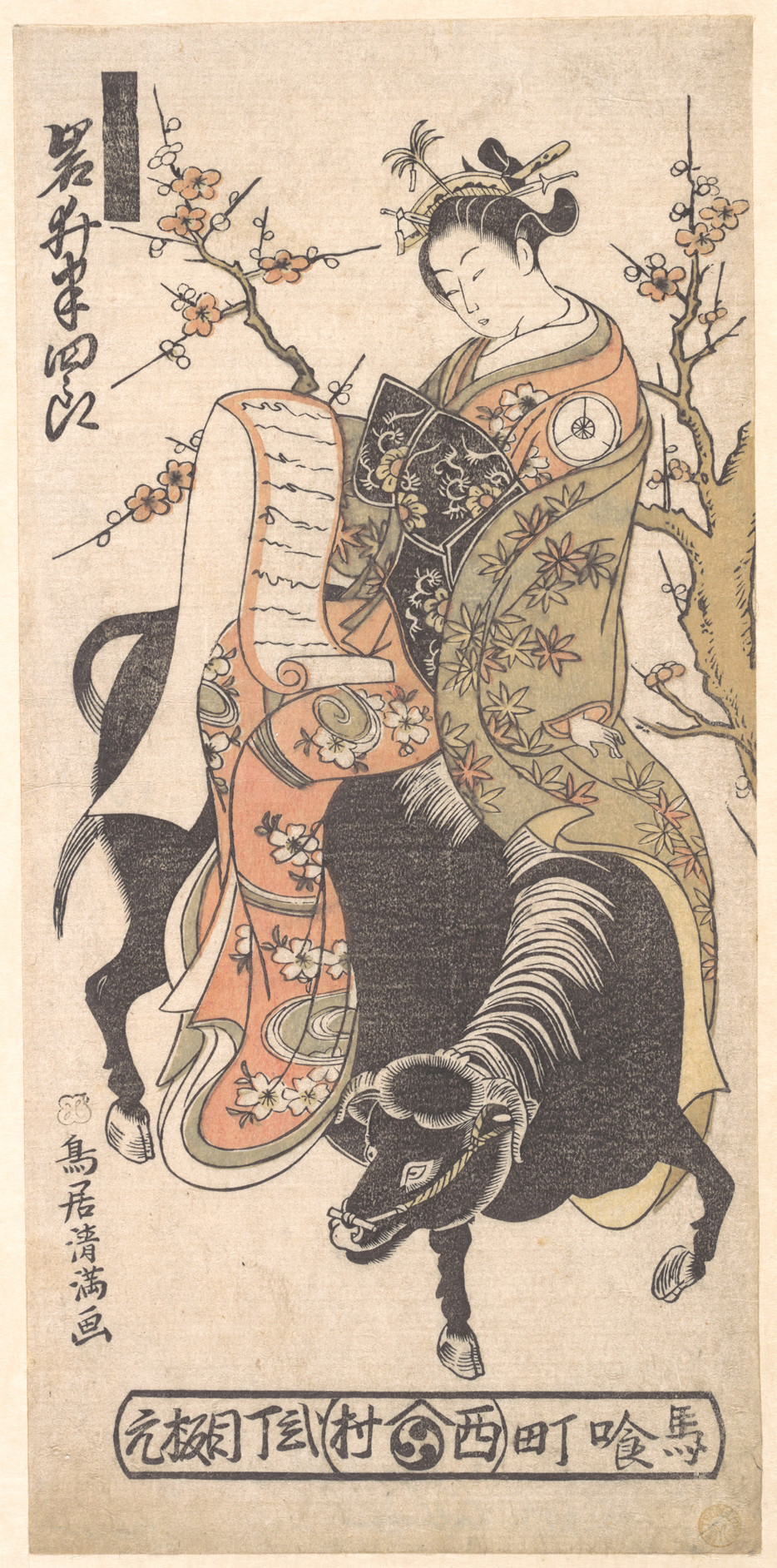 Courtesan Reading Love Letter – Formal Love
Courtesan Reading Love Letter – Formal Love
愛してますよ (ai shitemasu yo) is a more formal version of 愛してるよ (ai shiteru yo).
愛してますよ (Ai shitemasu yo) – I love you. / I’m in love with you. (Formal)
Formality in language is complex. While 愛してます (ai shitemasu) is formally “I love you,” its usage in intimate relationships is peculiar. Using formal language with someone you’re deeply connected with, especially when expressing profound love, can sound unnatural.
Asking a native speaker reveals that 愛してますよ (ai shitemasu yo) in a romantic context might even sound like you’re teasing or being insincere.
So, when is 愛してますよ (ai shitemasu yo) used?
Primarily, 愛してますよ (ai shitemasu yo) surfaces during proposals. It can also appear in melodramatic Japanese dramas (J-Dramas), particularly when someone is 告白してる (kokuhaku shiteru) – “confessing love” to someone they aren’t yet intimate with.
This limited usage contributes to the common perception:
“Japanese Men Don’t Say ‘I Love You'”
 Blush Emoji – Shyness in Love
Blush Emoji – Shyness in Love
It’s noteworthy that hearing 愛してる (ai shiteru) or 愛してます (ai shitemasu) in everyday Japan is rare, often confined to television or highly dramatic scenarios.
Some Japanese individuals express the sentiment that words aren’t necessary to feel love, emphasizing unspoken understanding.
A survey among Japanese men revealed reasons for not saying 愛してる (ai shiteru) to partners:
- Not wanting to use it casually.
- Shyness.
- Feeling it’s too soon.
- 好きだ (suki da) feeling more natural.
- Belief that “cool guys don’t fall in love.”
- Uncertainty about the definition of love.
- Not wanting to appear too eager or vulnerable.
- Feeling it would be insincere.
- Believing verbal expression is unnecessary.
This hesitancy reflects a broader cultural tendency in Japan to express feelings and opinions implicitly rather than explicitly.
恋 (Koi) for Third-Person “Love”?
Some resources mention phrases using the kanji 恋 (koi), like 恋しちゃった (koi shichatta) or 恋に落ちちゃった (koi ni ochichatta).
While related to romantic feelings, these phrases aren’t considered direct 愛情表現 (aijou hyougen – expressions of love) in the sense of “I love you” to the person. They describe “falling for someone” or “liking someone,” not a direct declaration of love.
In short, they don’t translate to “I love you” when spoken to the person you love.
You might use them to confide in a friend:
同じクラスの男の子に恋しちゃったみたい (Onaji kurasu no otokonoko ni koi shichatta mitai) – I think I might like this boy in my class. (Feminine sounding)
A possible dialogue:
A) 恋に落ちちゃったみたい (Koi ni ochichatta mitai) – I think I’ve fallen for someone.
B) え?!だれに? (E?! Dare ni?) – What?! Who?
Pronunciation Guide
Pronouncing these phrases becomes straightforward once you learn Japanese kana, achievable within a few weeks. Resources like NativShark can aid in this learning process and beyond, allowing you to discuss various expressions of liking and love in Japanese.
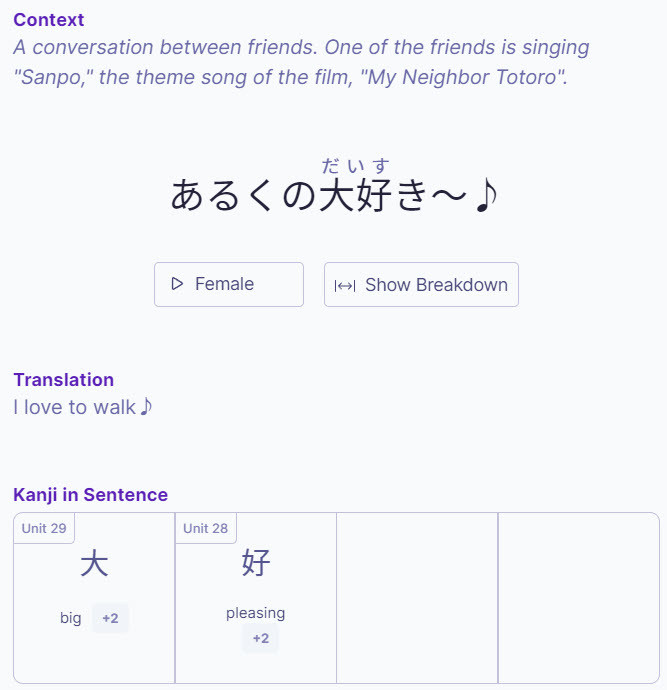 NativShark Love 1 – Language Learning
NativShark Love 1 – Language Learning
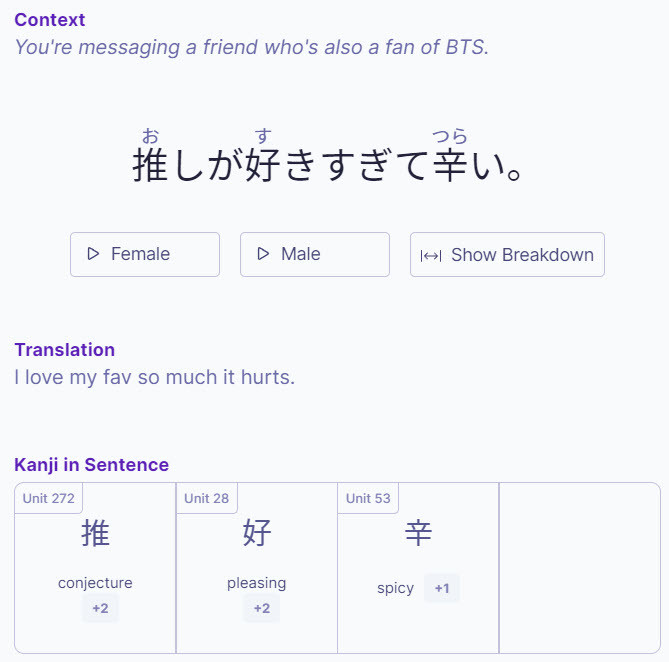 NativShark Love 2 – Kana Practice
NativShark Love 2 – Kana Practice
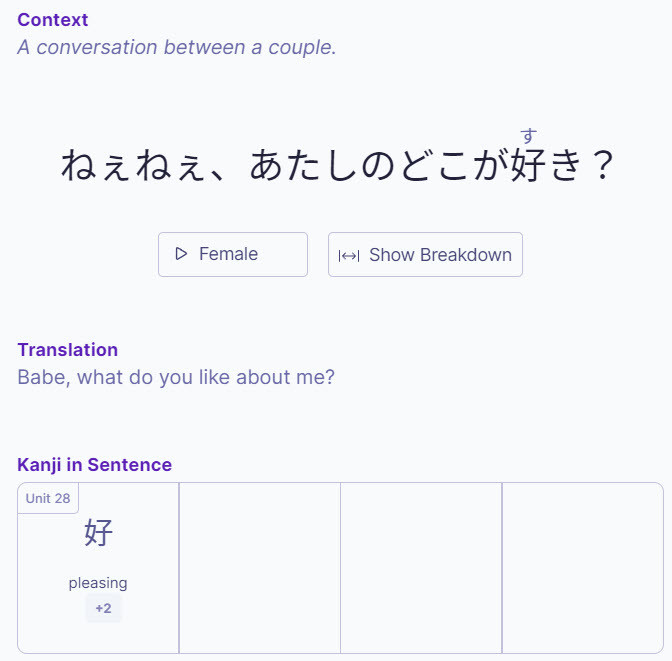 NativShark Love 3 – Vocabulary Building
NativShark Love 3 – Vocabulary Building
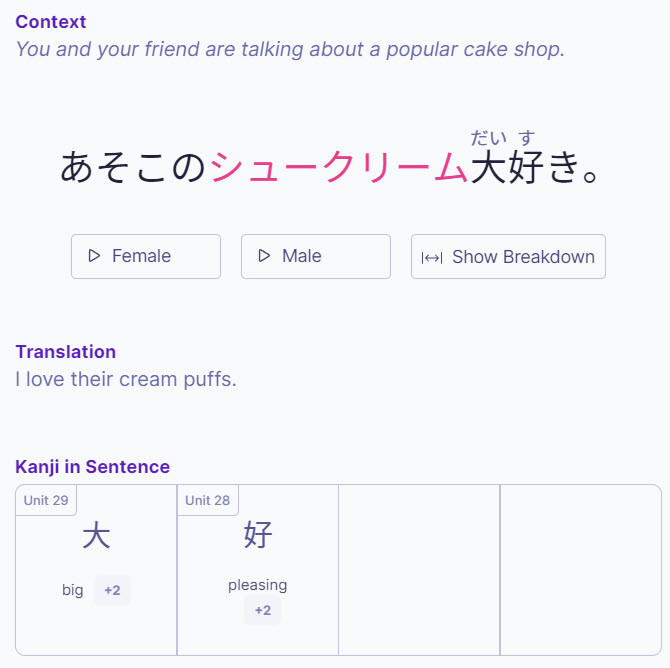 NativShark Love 4 – Immersive Learning
NativShark Love 4 – Immersive Learning
This exploration provides a deeper understanding of how to write and express “I love you” in Japanese, moving beyond simple translations to appreciate the cultural and linguistic nuances. Good luck on your journey of expressing love in Japanese!
For further questions, join our Japanese learners’ community on Discord.